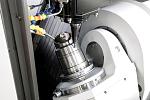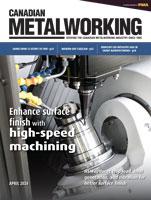Owner
- FMA
- The Fabricator
- FABTECH
- Canadian Metalworking
Prepare for manufacturing’s future
Diversification is the key to the future of Canadian machine shops
- By James Harrott
- May 27, 2020
- Article
- Management
I see a dire problem in Canada: Machine shops are suffering right now.
Without help, irreversible deterioration of the core of the Canadian manufacturing skill base will occur as more and more shops close permanently. Many shops are very regionalized and generally serve only one or two industry sectors. When downturns occur, these shops are vulnerable and suffer greatly.
Industry diversification helps manufacturers by cushioning the volatility -- often extreme volatility -- involved in any one industry sector. Equally as important, it also increases a manufacturer’s exposure to opportunities and market booms present elsewhere in the economy. Sometimes a market change that causes one sector to dip may encourage another to flourish.
COVID-19 Downturn
The downturn resulting from COVID-19 is an extreme systemic downturn, which means that powerful market forces are affecting nearly all industries in the economy. However, not all industries are completely shuttered. Some sectors are less affected or are even still quite busy.
If order sizes have shrunk or disappeared in the industry you usually serve, having more diversified customers that are geographically dispersed will help to mitigate some of that lost volume.
Here in Alberta, a province that depends greatly on the oil and gas sector, diversification is critical for survival. Market forces are especially powerful, and volatility is usually long term in the oil and gas sector.
Many Albertan machine shops have adopted the cyclical strategy of reducing costs to absorb the blow and not making any moves while waiting out the storm. This has proven to be a poor long-term strategy because they are not in a position to quickly resume operations when the downturn lifts., and that’s if it lifts at all. Sometimes market changes are permanent or, at least, very long term.
Diversification Is a Process
So, what are the first steps down the path to diversification?
The first one is making the decision to divert some of your time and resources toward the pursuit of diversification. This is a companywide cultural change. Like all change, it can be hard to get everybody on-board, particularly if they don’t see the need for diversification like you do.
It is especially important to do this during the good times (when many companies mistakenly don’t think they need to diversify) as well as in leaner times. Building a healthy business relationship takes time and considerable effort. It’s wise to begin building those relationships as soon as possible.
Next, it’s time to examine your shop from a potential customer’s point of view. Examine your strengths objectively, devoid of their current context. For example, don’t view yourself as solely a valve modification shop for the wastewater industry. Instead, recognize that you:
- Have the ability to machine uniquely shaped workpieces.
- Have experience with complex assemblies.
- Can reliably machine tight tolerances and surface finishes in difficult materials.
- Have a strong understanding of geometric dimensioning and tolerancing.
You can transition your research from those areas into other industries where these skills can be leveraged.
In addition to your technical know-how, sales skills, interpersonal skills, service reliability, commitment to quality, and dedication to customer satisfaction are solid-gold skills that many shops have and are universally transferrable.
Customers all over the world are looking to do business with shops that they trust. Machine shops are often surprised that obstacles like geography and currency exchange that they once thought would hinder their competitive advantage are overlooked when a customer begins to trust its supplier. This is why it’s key to be an operationally efficient shop that can manoeuver quickly and deliver quality reliably.
Grants and other programs are available to shops that want to diversify.
- The federal government’s Industrial Research Assistance Program (nrc.canada.ca/en/support-technology-innovation)
- The CanExport program, which falls under the trade commissioner’s umbrella (www.tradecommissioner.gc.ca/funding-financement/canexport/index.aspx)
- Western Economic Diversification Canada (www.wd-deo.gc.ca/eng/16.asp)
I currently have customers in the greater Edmonton area that are interested in our services because we provide consultation that is helping to bridge the knowledge and skill gap that is present when you want to work in new industry sectors.
These shops are well-prepared and -equipped to serve customers that are traditionally their bread and butter in the petroleum rig pipe handling industry. They can do this because they have a lot of skill and experience in the machining techniques used to manufacture products in this market sector. Now they are attempting to compete in alternative industry sectors like medical and aerospace, but they don’t have any experience in those industries. By developing organizational agility and technical flexibility, they can succeed.
For example, one of our customers wants to branch out to start bidding on jobs in the medical industry. Components in this sector often require efficient micromachining processes. We have been working with this shop to advise them on the relevant tooling, setups, and programming techniques used in micromachining. Critically, we are also working with them to get their quality management system up to medical industry specifications.
It’s one of many local shops that we are helping take the first steps toward diversification.
We also are currently preparing a proposal for the federal government to seek funding for Canadian machine shops that are interested in hiring skilled consultants to help develop technical agility and improve operational efficiency. I encourage any shops that are interested in learning more about this outreach to get in touch.
This benefits Canadian industry by mitigating the boom-and-bust nature of regionalized manufacturing. It supports Canadian tradespeople and businesspeople by adding permanent value that builds self-sufficient, stronger global competitors. The funding from the government would offset the majority of the cost of training.
Funding is critical because Canadian machine shops are in a vulnerable financial situation with much strain on their cash flow.
Diversification Needs Technology
Keeping up-to-date with advancements in machine shop technology is only going to help you. The important factor to consider is that having a modern shop doesn’t necessarily mean having the most expensive machines that even Elon Musk would be jealous of.
Technology that can help you improve operations greatly is more accessible than at any point in history. It’s easy to leverage simple and available technology to make life easier and more profitable.
Canadian machine shops are on their knees right now. The skill equity that we’ve painstakingly developed over decades will permanently disappear, and Canada will be even more at the mercy of global storms rather than solidly anchored through those storms by a skilled workforce.
Diversifying is made easier when a machine shop has skilled, experienced workers.
It’s relatively easy for shops to find workers to perform generic labour. The nearly impossible task, however, is finding and fostering skilled people who have a passion for their craft and an innate desire to deliver excellence every day.
We cannot lose these people to other careers and other countries because the damage would be too severe.
James Harrott is owner of Hillforther Solutions, Leduc, Alta., 780-680-4217, www.hillforthersolutions.com.
About the Author
subscribe now


Keep up to date with the latest news, events, and technology for all things metal from our pair of monthly magazines written specifically for Canadian manufacturers!
Start Your Free Subscription- Trending Articles
Automating additive manufacturing

Sustainability Analyzer Tool helps users measure and reduce carbon footprint

GF Machining Solutions names managing director and head of market region North and Central Americas

Mitutoyo updates its end-user portal

Enhance surface finish with high-speed machining

- Industry Events
CTMA Economic Uncertainty: Helping You Navigate Kitchener Seminar
- May 2, 2024
- Kitchener, ON Canada
Automate 2024
- May 6 - 9, 2024
- Chicago, IL
ANCA Open House
- May 7 - 8, 2024
- Wixom, MI
17th annual Joint Open House
- May 8 - 9, 2024
- Oakville and Mississauga, ON Canada
MME Saskatoon
- May 28, 2024
- Saskatoon, SK Canada
















